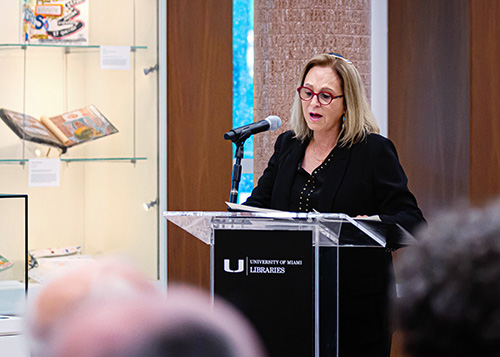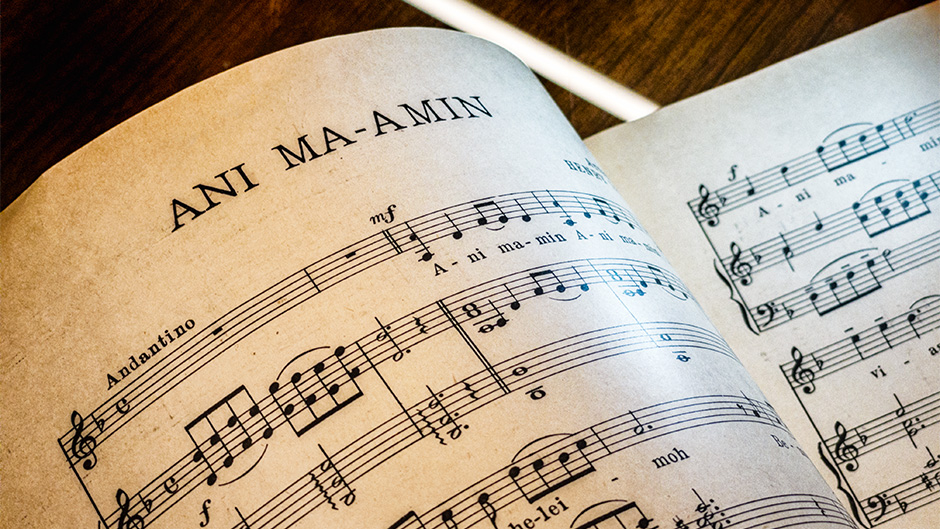Personal letters and complete opera scores. Tin Pan Alley ditties and classical masterworks notated by legendary conductor Arturo Toscanini. A 1795 edition of Mozart’s Clemenza di Tito and a manuscript of Puccini’s exquisite art song “Sogno d’Or” (“Sweet Dream”).
These are just a few of the treasures that will join the Alfred Camner, Anne Camner and Camner Family Music Collection, thanks to a third donation of rare early musical editions, autographed and noted scores, signed letters, and other items from the family. Housed in the Marta and Austin Weeks Music Library and Technology Center at the Frost School of Music, this gift to the University Libraries collections encompasses works spanning nearly four centuries and many parts of the world.
About 30 years ago, Alfred Camner, a University of Miami trustee and chair of the University Libraries Dean’s Advisory Committee, and Anne Camner began collecting early musical manuscripts, first published editions, and other musical historical materials. In 2016 the Camners, along with their children, Danielle Camner Lindholm, Errin Camner, Lauren Camner Winter, and Andrew Camner—all alumni of the University—established the collection with a donation of 124 early editions of masterworks by musical giants from Beethoven to Gershwin.
At the time, Alfred Camner spoke of his family’s desire to create an inspirational musical teaching resource at the Frost School, which he praised for its “significant educational and innovative impact” on aspiring musicians and music professionals.
In 2018 the remarkable trove nearly doubled in size, thanks to a second gift from the Camner family of 106 new items. In addition to works by musical giants such as Mozart, Beethoven, Schubert, Mussorgsky, Stravinsky, and Berlin, it included opera scores by Puccini and Verdi, an 1824 American printing of Handel’s “Hallelujah Chorus,” and a first edition of Ravel’s “Daphnis and Chloe.”
The family’s latest gift comprises 62 printed music scores, signed letters, and other musical ephemera related to famed composers from the same time periods. Though the trove focuses primarily on classical works and accompanying items from the 18th and 19th centuries, 20th-century popular and art music is also represented.
According to Cheryl Gowing, music librarian and interim director of the Weeks Music Library, the various ways in which archival editions of classic works are printed and bound and the notations and markings that they often include reveal how they were studied and performed by musicians through time.
Gowing noted that the third Camner family donation features a large number of autographed cards, postcards, and letters. “Here we are in Miami,” she said, “and we can see something that Liszt or Bartók wrote, a doodle or notation in their own handwriting. It really brings the human aspect of these musical giants and their works to life.”
A Journey Through Musical History
The many items of interest in the latest donation also include early editions of Bizet’s opera “Carmen,” Brahms’ Hungarian Dances, and Beethoven’s Symphony No. 7, Mass in C Major, and “Fidelio”; a 1777 edition of John Gay’s “Beggar's Opera,” considered the most popular play of the 18th century (and precursor to Bertold Brecht’s “Threepenny Opera,” written 200 years later); a letter from Richard Wagner’s wife Cosima (daughter of composer Franz Liszt) regarding the staging of “Die Walkure” (“The Valkyrie”), the second opera in Wagner’s “Ring Cycle”; signed record album notes by Woody Guthrie; sheet music by Oscar Hammerstein and Scott Joplin; and letters, scores, and other archival items from composers such as Bartok, Liszt, Massenet, Ravel, Schoenberg, Strauss, Stravinsky, Tchaikovsky, and Verdi.
Among the most poignant is “Ani Ma-amin: The Song of the Martyrs in the Concentration Camps,” composed by Azriel David Fastag during a cattle car ride to the Treblinka concentration camp. Fastag told his fellow inmates that he would give half his share of the world to come to whomever could bring the melody to the Modzitzer Rebbe (Rabbi) Shaul Yedidya Elazar. Two men leapt from the train to take him up on his promise. One died, but the other escaped and made it to Israel, where he gave the music to the rabbi’s son. The work was performed by a Jewish cantor at the May 17 opening of “Visages of Memory: Honoring Holocaust Survivors and Preserving Their Memories,” an exhibition at the Kislak Center at the University of Miami.

“We salute the Camner Family for their understanding of the scholarly value of this superb collection,” said University of Miami Libraries Dean Charles Eckman. “Their generosity has created a teaching and research resource on a par with some of the most important such collections at other leading universities.”
“This remarkable collection, which includes exceedingly rare and many unique materials, will introduce Frost students and faculty to some musical figures and works with which they aren’t yet familiar,” says David Ake, Frost School of Music professor and chair of the Department of Musicology. “Just as importantly, it will offer new perspectives, insights, and ways of performing, teaching, and writing about legendary musicians and compositions.”
Once each piece has been catalogued and its physical condition evaluated, optimized, and protected by the University of Miami Libraries’ expert conservation department, many of the collection’s artifacts will be available to scholars for use within the library for teaching and research purposes. Rotating exhibits from the collection will be mounted at both the Weeks Music Library and the Kislak Center in the Otto G. Richter Library.
As with the earlier donations, the recently acquired items, complete with notations and other markings, will be logged into the University of Miami Libraries catalog and made accessible to music students and researchers around the world via the WorldCat library database.
“Words cannot fully express our profound gratitude to the Camner family,” said Dean Shelton Berg of the Frost School of Music. “This new gift builds on an extraordinary collection, offering insights into the thoughts and ruminations of leading figures in music history as well as original sources of iconic musical works for study and performance.
“The Camner Collection is a magnificent resource that will enlighten and inspire generations of students, faculty, and researchers.”

